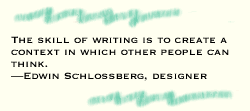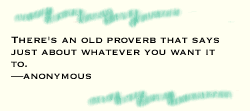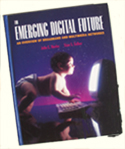There's a reason that media-based training has a reputation for being boring: It's boring. Well-intended people with academic and technical backgrounds have understood that interactive media, and even linear video, can be highly effective training tools. They just neglected to hire a designer with a flair for igniting the audience's imagination.

Energy and humor can't be added on. They must be a fundamental part of the initial instructional design, driven by specific training points. That's where my background in marketing comes in: a proven ability to build energy and urgency right into the design framework.
And oh yeah, there was also that decade that I was writing screenplays. No, you haven't seen my work at your local multiplex, but the experience ensures that I now develop role plays and examples that are far more compelling than the cardboard scenarios that make typical training...well, boring.
Classroom, Self-Paced and Good Old-Fashioned Print
Let's talk about your next training project. My experience with training includes designing for the classroom, interactive, linear video, workbooks and print. And some times, the best training is not training at all, but an effective job aid that puts the right information in the right place at the right time. This broad skill set means that I can counsel you and design for the most appropriate complete package, rather than the technology du jour.
Some people call this blended training. I just call it common sense, engaging the learner in all appropriate ways that reinforce learning and ensure that knowledge gained is applied on the job. And that technology du jour? I love it, and if you think it is appropriate, I can help ensure that it is used to fullest advantage.
Technical Training
 For technical projects, especially involving computers, data storage, software and networks, you'll find that I am already a good way up the learning curve and can quickly learn about your specific product, service or situation. For technical projects, especially involving computers, data storage, software and networks, you'll find that I am already a good way up the learning curve and can quickly learn about your specific product, service or situation.
I am expert enough with Microsoft Word to have developed procedures for courseware production based on that software that is still in use at Hitachi Data Systems, which of course involved writing all of the procedures and user documentation, and training their writers in its use.

|
 Another set of templates I have coded in Visual Basic is enjoying success as commercial products, under two different names: Script
Werx and Dr.
Format. This is software for scriptwriting, now used by thousands of writers, including the staff at Saturday Night Live. And of course, I wrote all documentation for both products, plus several customized variations. Another set of templates I have coded in Visual Basic is enjoying success as commercial products, under two different names: Script
Werx and Dr.
Format. This is software for scriptwriting, now used by thousands of writers, including the staff at Saturday Night Live. And of course, I wrote all documentation for both products, plus several customized variations.
 But more important than expertise with software is the ability to structure and translate complex technical instructions into concise, easy-to-use training and documentation. I take special pride in my ability there, as co-author of the book The
Emerging Digital Future (on data networks), writer and instructional designer for a series on data communications for GTE, documentation for sales tracking software developed at Multacom and many courseware titles addressing enterprise-wide data storage for Hitachi Data Systems. But more important than expertise with software is the ability to structure and translate complex technical instructions into concise, easy-to-use training and documentation. I take special pride in my ability there, as co-author of the book The
Emerging Digital Future (on data networks), writer and instructional designer for a series on data communications for GTE, documentation for sales tracking software developed at Multacom and many courseware titles addressing enterprise-wide data storage for Hitachi Data Systems.
Classroom Experience
Some of the best insight into how people learn is gained in the front of a classroom. I'm fortunate to have had this experience in a number of situations, presenting course material of my own design:
-
Trade show experience
--(a type of classroom where student attention spans are even shorter than usual)-demonstrating storyboarding software (from
PowerProduction software
) and my own
Script Werx
software. 1995-present.
-
FIDM (Fashion Institute of Design and Merchandising)
--Design and teach a class on Web site design for this private college. 1998.
-
UCLA
--Guest speaker for a number of classes, speaking on scriptwriting. 1990-1998.
-
California State University at Northridge (CSUN)
--Degree program course on scriptwriting for informational media. 1991-1994.
-
Commission on Peace Officer Standards and Training
--Seminar on developing training media. 1997.
-
PGA Tour Productions
--Scriptwriting seminar for the producer/writers responsible for all television programming produced by the Professional Golfers' Association Tour. 1994.
-
Truby's Writers Studio
--Seminar on scriptwriting for corporate video. 1991.
-
Seminars
--Scriptwriting seminars conducted in conjunction with professional conferences or sponsored by professional organizations, including Video Expo, Corporate Video, Cinema in Industry (CINDY), Intl. Television Assn. ITVA and Show Biz Expo. 1988-1995.
|

|

